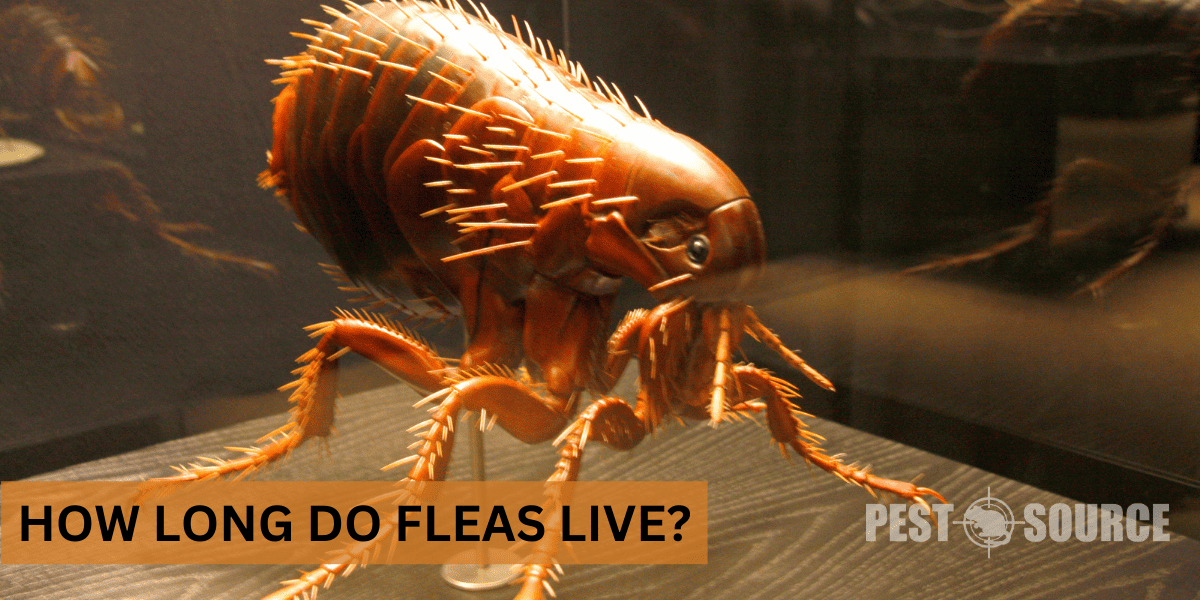Understanding how long fleas live can be really important, especially for folks who own pets or houses. These tiny pests, which can’t fly, can cause a lot of trouble. Knowing how long they can live, both with and without a pet to live on, can help a lot when you’re trying to get rid of fleas or stop them from showing up in the first place.
This article talks about everything from how long fleas usually live, how they have babies, and how they get by in different places and situations. We also talk about how fleas can live in different places, like your clothes, furniture, or even your car, and how to deal with them if they do show up. By learning all this, you can help keep your home comfortable and safe for both you and your pets.
POINTS
- Fleas have a lifespan of 2 to 3 months on average but can survive up to a year under ideal conditions. Their lifespan can vary depending on the species, such as dog fleas and cat fleas.
- The flea life cycle consists of four stages: egg, larva, pupa, and adult. The entire cycle can take around 18 to 26 days, with the potential to extend up to several months, depending on environmental conditions. Fleas reproduce quickly, with a female flea laying up to 50 eggs per day.
- Without a host, adult fleas can survive only for a few days to a couple of weeks. However, flea larvae can survive several weeks by feeding on organic debris and adult flea feces in the environment.
- Fleas can survive in various indoor and outdoor environments, such as carpets, furniture, or soil, depending on conditions like temperature and humidity. Their survival is dependent on their life stage and access to food sources.
- Managing flea infestations requires regular grooming of pets, appropriate flea treatments, and maintaining a clean environment. Consult a veterinarian for the best prevention and treatment methods for your specific pet.
What is the Average Lifespan of Fleas?
How long do fleas live?

The lifespan of a flea generally ranges from 2 to 3 months, but under ideal conditions, some fleas can live up to a year. In contrast, without access to a host, an adult flea may survive for just a few days.
Does the lifespan of a flea vary depending on the type (dog fleas, cat fleas)?
Yes, the lifespan of a flea can vary depending on its type. Here’s a quick overview of how the lifespan differs between dog fleas and cat fleas, two common types encountered by pet owners:
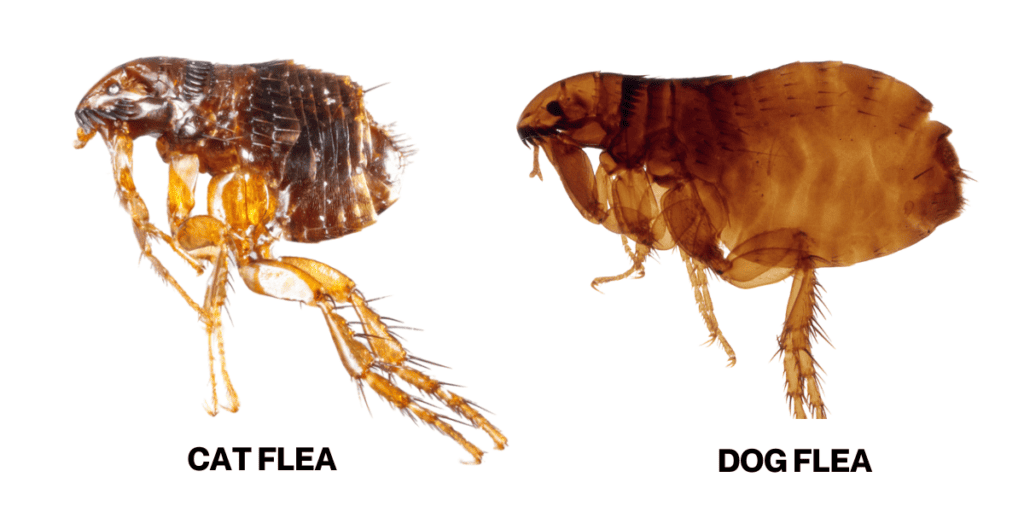
- Dog Flea (Ctenocephalides canis): Typically lives up to 2 months.
- Cat Flea (Ctenocephalides felis): Can live slightly longer, often 3 or more months under ideal conditions.
What is the life cycle of a flea?
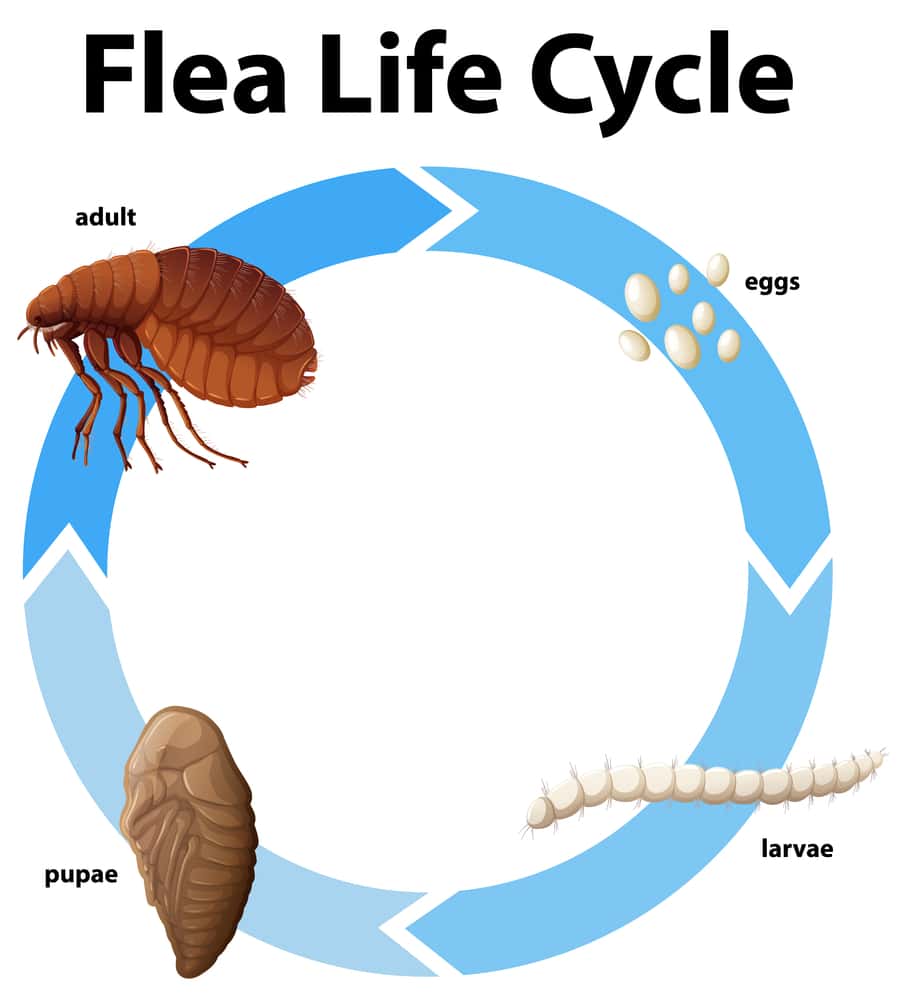
The flea life cycle consists of four stages: egg, larva, pupa, and adult. The entire cycle takes approximately 18 to 26 days but can extend up to several months, depending on environmental conditions.
| Stage | Duration | Key Characteristics |
|---|---|---|
| Egg | 1 to 10 days | Laid on host and fall into the environment; very tiny and hard to see. |
| Larva | 4 to 18 days | Feeds on organic debris and adult flea feces; undergoes three molts before pupating. |
| Pupa | 4 days to several months | Develops inside a cocoon; can remain dormant until conditions are favorable. |
| Adult | 2 to 3 months | Emerges from cocoon when a host is nearby; begins feeding and laying eggs. |
How do fleas reproduce and how fast do they multiply?
Fleas are notorious for their rapid reproduction and ability to multiply quickly, posing a significant challenge for pet owners.
- Reproduction Rate:
- A female flea can lay up to 50 eggs per day.
- Over its lifetime, a female flea can lay approximately 2,000 eggs.
- Multiplication:
- Due to their high reproduction rate, a small flea infestation can quickly escalate into a significant problem if not addressed.
- The fast multiplication emphasizes the need for prompt and effective flea control measures.
What is the life expectancy of a flea?
The life expectancy of a flea depends on factors such as species, environmental conditions, and access to a host. On average, adult fleas live for 2 to 3 months. Under ideal conditions with plenty of food, some fleas may live up to a year. However, without a host, an adult flea could die in just a few days.
How Do Fleas Survive Without a Host?
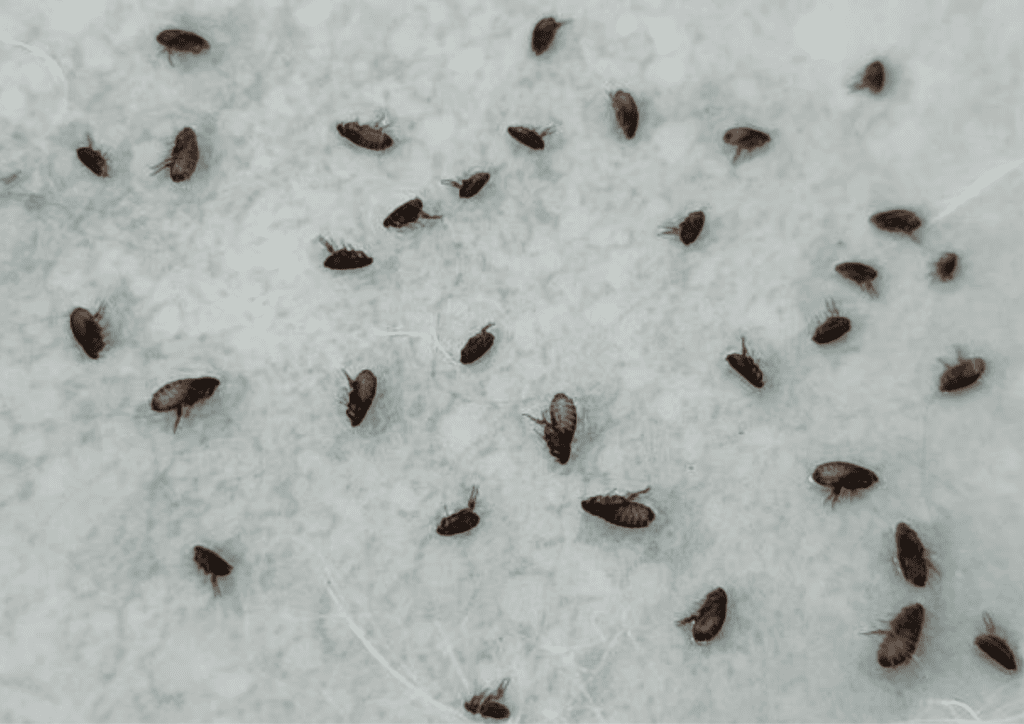
Can fleas live without a host?
While fleas prefer to live on a host to feed off its blood, they can survive without one for a limited amount of time. The survival of fleas without a host is dependent on factors such as their life stage, access to food, and environmental conditions.
How long do fleas live without a host?
Fleas have developed various strategies to survive even without direct access to a host, a trait that makes them particularly resilient pests. The following table breaks down how long fleas can survive at different life stages without a host, alongside the conditions that can affect their survival.
| Life Stage | Survival Duration | Conditions Affecting Survival |
|---|---|---|
| Adult | A few days to a couple of weeks | Requires blood meals for survival; lifespan shortens without a host. |
| Larvae | Several weeks | Can thrive without a host by feeding on organic debris and adult flea feces. |
How long can fleas survive without a host?
The survival of fleas without a host depends on their life stage and environmental conditions. Under ideal conditions, adult fleas can survive for around 2 to 3 weeks without a host, while flea larvae can survive for several weeks without access to a host.
Do fleas die without a host or can they go away on their own?
Without a host, adult fleas will eventually die due to starvation. However, this does not mean the problem will disappear on its own, as flea larvae can still survive and develop into new adult fleas that will seek out a new host.
Can fleas reproduce without a host?
Fleas cannot reproduce without a host, as adult female fleas require a blood meal to lay eggs. However, flea larvae do not need a host and can survive by feeding on organic debris in the environment.
What Conditions Impact the Lifespan of Fleas Without a Host?
How long do fleas last without food or blood?
The lifespan of adult fleas without access to food or blood is considerably shorter compared to when they have access to a host. On average, adult fleas can survive only a few days to a couple of weeks without food.
What do fleas need to survive without a host?
The lifespan of fleas without a host is significantly influenced by environmental conditions, which can either shorten or extend their survival. The table below outlines how different environmental factors, such as temperature and humidity, impact the survival of flea eggs, larvae, and adult fleas.
| Condition | Impact on Eggs | Impact on Larvae | Impact on Adult Fleas |
|---|---|---|---|
| Temperature | Optimal at 70°F to 85°F | High mortality outside optimal range | Shortened lifespan in extreme temperatures |
| Humidity | Requires over 50% to hatch | Thrives at 70% to 85% | Desiccation risk in low humidity |
In these conditions, flea larvae can thrive by consuming organic debris and adult flea feces.
How long can flea eggs live without a host?
Flea eggs do not require a host and can survive for up to several weeks before hatching. However, flea eggs are sensitive to temperature and humidity levels, and their survival can be affected by environmental conditions.
How Long Can Fleas Survive in Different Environments?
Fleas can adapt to a variety of environments, which affects their lifespan and the risk of infestation in different settings.
| Environment | Lifespan |
|---|---|
| On Pets | Entire lifespan (2 to 3 months) |
| In Homes (without pets) | Several weeks to months, depending on stage and conditions |
| On Humans | Do not live on humans but can bite |
| On Clothes | A few days to 1 week |
| On Furniture | Several weeks, depending on conditions |
| In Carpets | Up to several months, depending on conditions |
How long can fleas live on humans, pets, clothes, and furniture?

Fleas typically prefer animal hosts, but they can bite humans if no other host is available. Fleas do not live on humans, but they can hitch a ride on clothing for a short period. Adult fleas can live on pets, such as cats and dogs, throughout their entire lifespan of 2 to 3 months. Fleas can also survive on furniture and other household items for several weeks, depending on access to a food source and environmental conditions.
How long do fleas live in a house or a car without pets?

Fleas can survive in a car or house without pets for several weeks or even months, depending on environmental conditions and developmental stage. Flea eggs, larvae, and pupae are capable of surviving for extended periods by relying on organic debris as a food source. In warmer and more humid environments, fleas can develop and thrive without the presence of pets.
Can fleas live in carpet, and if so, for how long?

Fleas can indeed infest carpets, and they can survive there for several months, depending on their developmental stage and environmental conditions. Flea eggs can fall off pets and onto carpets, providing a conducive environment for flea larvae to develop. Carpets also provide protection from direct sunlight and extreme temperature changes, allowing fleas to thrive.
Where do fleas live outside? Do they live in dirt?

Outside, fleas can live in various environments, including tall grass, soil, under leaf piles, and in shrubs. Flea larvae can thrive in dirt, feeding on organic debris. Outdoor environments with warm temperatures and high humidity levels provide ideal conditions for fleas to survive and reproduce.
How to Effectively Deal with Fleas?
Will fleas die off on their own or go away without pets?
Fleas are unlikely to die off on their own entirely or go away without pets. Although adult fleas may die from starvation in the absence of a host, flea eggs, larvae, and pupae can continue to develop, creating new generations of adult fleas.
How long does it take for fleas to die off?
The time it takes for fleas to die off depends on factors such as environmental conditions and the presence of hosts. In the absence of a host and unsuitable environmental conditions, adult fleas can die within a few days. However, flea eggs, larvae, and pupae can survive for much longer periods.
How many fleas can live on a cat or a dog, and how to manage this?
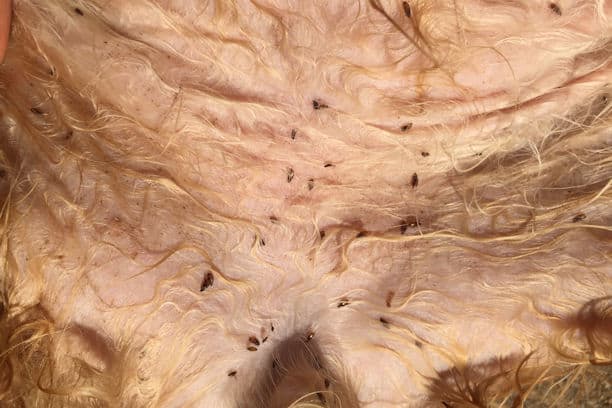
There is no definitive number of fleas that can live on a cat or dog, but infestations can range from just a few fleas to hundreds. To manage and prevent flea infestations, rely on regular and thorough grooming, topical or oral flea treatments, and maintaining a clean environment for your pet. Consult with your veterinarian for the appropriate prevention and treatment methods for your specific pet.
Conclusion
Flea lifespan and survival are influenced by various factors, including species, developmental stage, environmental conditions, and access to a host. Understanding these factors, combined with effective prevention and treatment measures, can help manage and prevent flea infestations, keeping both your pets and household safe, healthy, and comfortable.

